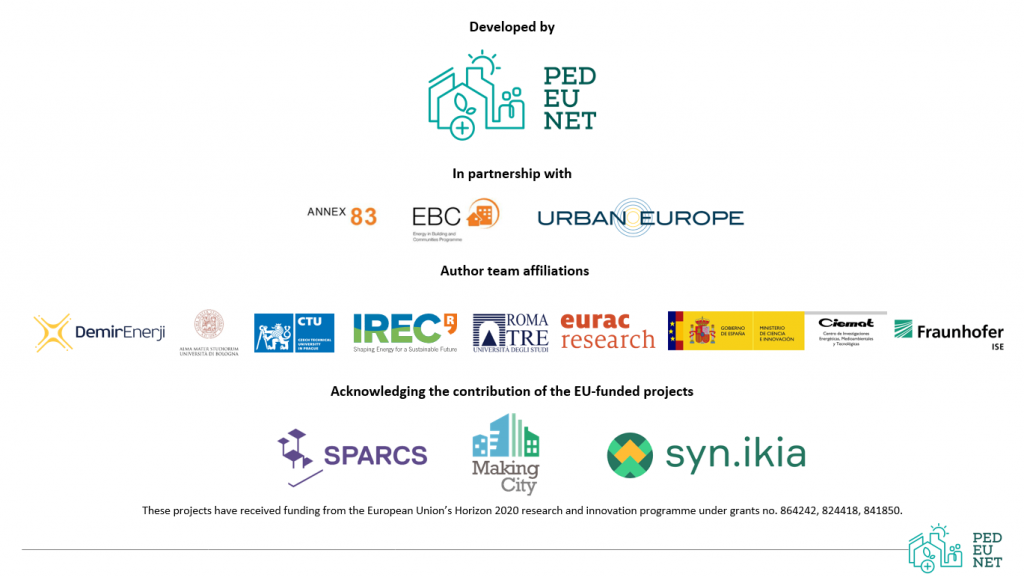| D1P001: Name of the project | |
| D1P001: Name of the project | RESPED - Enabling Energy Resilience through new energy flexible and affordable PED concepts |
| D1P002: Project assigned code | |
| D1P002: Project assigned code | |
| D1P003: Start date | |
| D1P003: Start date | 01/25 |
| D1P004: End date | |
| D1P004: End date | 12/27 |
| D1P005: Ongoing project | |
| D1P005: Ongoing project | Yes |
| D1P006: Funding programme/financing model | |
| FP7/H2020/HEU/DUT | no |
| Interreg | no |
| National funding | no |
| Public-Private Partnership - please specify | no |
| Other | yes |
| D1P006: Other | DUT |
| D1P007: Estimated project costs (Mill. €) | |
| D1P007: Estimated project costs (Mill. €) | 2.6 |
| D1P008: Description of project objectives/concepts | |
| D1P008: Description of project objectives/concepts | The main aim of RESPED is to support cities in their transition towards a more sustainable economy and infrastructure by studying how PEDs can drive this development, especially through improved resilience and increased affordability and the identification of solutions most acceptable for the affected citizens. This will be achieved through a better understanding of the different dimensions of resilience to which PEDs can contribute. In a participatory process involving three Urban Living Labs (ULL) in Finland, the Czech Republic and Austria and a set of municipalities in Italy, a systems based approach will help to understand the technical preconditions as well as the drivers ULLs are embedded in and the interdependencies between actors. |
| D1P009: Description of project upscaling strategies/potential | |
| D1P009: Description of project upscaling strategies/potential | The project will help to improve decision-making at the mesoscale of the neighbourhood and city, while zooming into the microscale behaviour level of districts, aiming to make citizens drivers for change and creating PEDs with the greatest impacts on energy poverty reduction and resilience. A city learning community will enable cross country learning and replicability of innovative concepts and technologies. |
| D1P010: Number of PED case studies in the project | |
| D1P010: Number of PED case studies in the project | 3 |
| D1P011: Case Study | |
| D1P011: Case Study | |
| D1P012: Description of project expected impact | |
| D1P012: Description of project expected impact |
|
| D1P013: Standardization efforts | |
| D1P013: Standardization efforts | |
| D1P014: Sources | |
| D1P014: Sources | |
| D1P015: Can you specify a suitable contact person regarding the load-management approach within your PED project? | |
| Name | Andreas Tuerk |
| andreas.tuerk@joanneum.at | |
| D1P016: Would you be willing to share data from your PED project for research purposes? | |
| D1P016: Would you be willing to share data from your PED project for research purposes? | Yes |

Authors (framework concept)
Beril Alpagut (Demir Energy); Giulia Turci (University of Bologna); Michal Kuzmic (Czech Technical University in Prague); Paolo Civiero (Università Roma Tre); Serena Pagliulia (University of Bologna); Oscar Seco (CIEMAT); Silvia Soutullo (CIEMAT); Daniele Vettorato (EURAC Research, IEA Annex 83); Bailador Ferreras M. Almudena (CIEMAT); Vicky Albert-Seifried (FHG ISE)
Contributors (to the content)
Laura Aelenei (LNEG), Nienke Maas (TNO), Savis Gohari (OsloMet), Andras Reith (ABUD), Ghazal Etminan (AIT), Maria-Beatrice Andreucci (Universita Sapienza), Francesco Reda (VTT, IEA Annex 83), Mari Hukkalainen (VTT), Judith-Borsboom (Locality), Gilda Massa (ENEA), Jelena Ziemele (University of Latvia), Nikola Pokorny (CVUT), Sergio Diaz de Garayo Balsategui (CENER, IEA Annex 83), Matthias Haase (ZHAW, IEA Annex 83), Christoph Gollner (FFG, JPI UE), Silvia Bossi (ENEA, JPI UE), Christian Winzer (Zurich University of Applied Science), George Martinopoulos (Centre for Research and Technology Hellas), Maria Nuria Sánchez (CIEMAT), Angelina Tomova (Energy Agency of Plovdiv), Oya Tabanoglu (Demir Enerji), Jelena Brajković (University of Belgrade), Juveria Shah (Dalarna University), Michela Pirro (ENEA), Francesca Sabatini (University of Bologna)
Implemented by
Boutik.pt: Filipe Martins, Jamal Khan
Marek Suchánek (Czech Technical University in Prague)